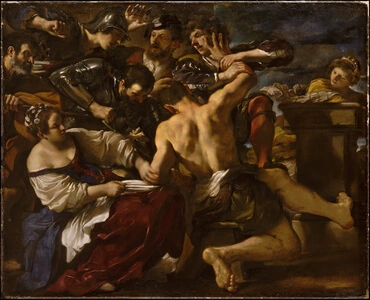1
As palavras de Amós, que estava entre os pastores de Tecoa, o que ele viu a respeito de Israel, nos dias de Uzias, rei de Judá, e nos dias de Jeroboão, filho de Joás, rei de Israel, dois anos antes do terremoto.
2
Disse ele: O Senhor brama de Sião, e de Jerusalém faz ouvir a sua voz; os prados dos pastores lamentam, seca-se o cume do Carmelo.
3
Assim diz o senhor: Por três transgressões de Damasco, sim, por quatro, não retirarei o castigo; porque trilharam a Gileade com trilhos de ferro.
4
Por isso porei fogo à casa de Hazael, e ele consumirá os palácios de Bene-Hadade.
5
Quebrarei o ferrolho de Damasco, e exterminarei o morador do vale de Ávem e de Bete-Éden aquele que tem o cetro; e o povo da Síria será levado em cativeiro a Quir, diz o Senhor.
6
Assim diz o Senhor: Por três transgressões de Gaza, sim, por quatro, não retirarei o castigo; porque levaram cativo todo o povo para o entregarem a Edom.
7
Por isso porei fogo ao muro de Gaza, e ele consumirá os seus palácios.
8
De Asdode exterminarei o morador, e de Asquelom aquele que tem o cetro; tornarei a minha mão contra Ecrom; e o resto dos filisteus perecerá, diz o Senhor Deus.
9
Assim diz o Senhor: Por três transgressões de Tiro, sim, por quatro, não retirarei o castigo; porque entregaram todos os cativos a Edom, e não se lembraram da aliança dos irmãos.
10
por isso porei fogo ao muro de Tiro, e ele consumirá os seus palácios.
11
Assim diz o Senhor: Por três transgressões de Edom, sim, por quatro, não retirarei o castigo; porque perseguiu a seu irmão à espada, e baniu toda a compaixão; e a sua ira despedaçou eternamente, e conservou a sua indignação para sempre.
12
Por isso porei fogo a Temã, o qual consumirá os palácios de Bozra.
13
Assim diz o Senhor: Por três transgressões dos filhos de Amom, sim por quatro, não retirarei o castigo; porque fenderam o ventre às grávidas de Gileade, para dilatarem os seus termos.
14
Por isso porei fogo ao muro de Rabá, fogo que lhe consumirá os palácios, com alarido no dia da batalha, com tempestade no dia do turbilhão.
15
E o seu rei irá para o cativeiro, ele e os seus príncipes juntamente, diz o Senhor.







